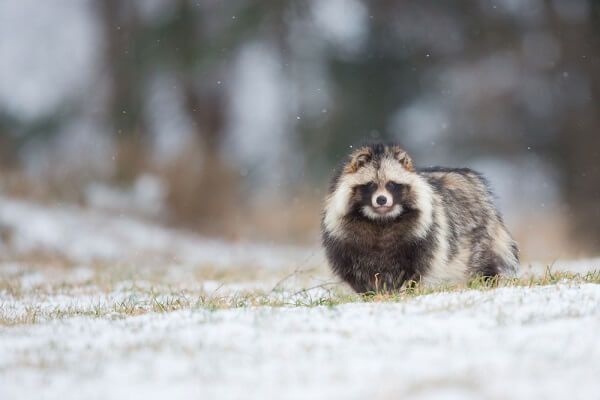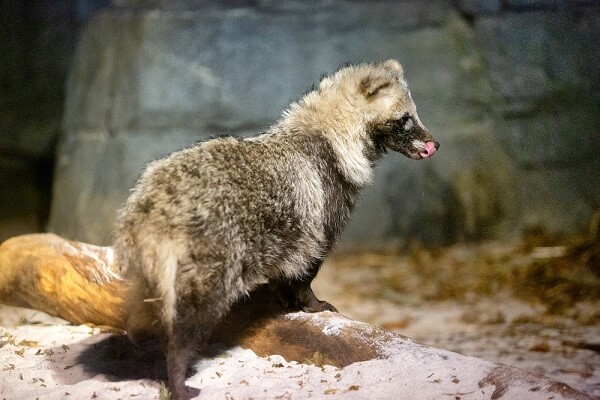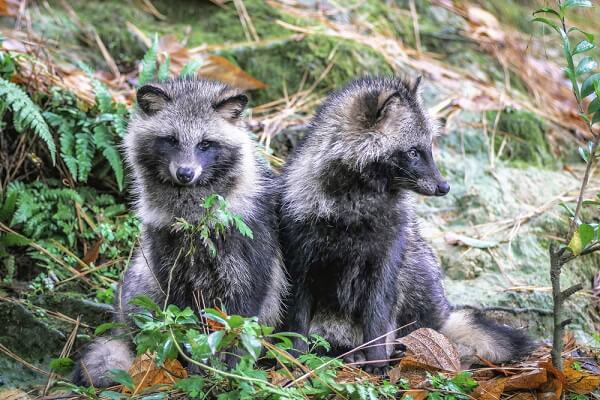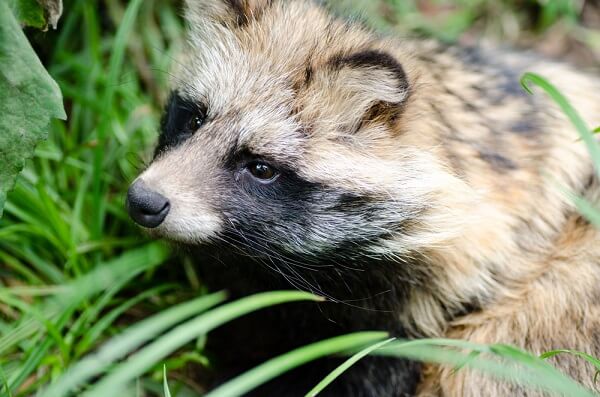
The tanuki is a subspecies of the raccoon dog, native to parts of Eastern Asia. The tanuki – sometimes called the Japanese raccoon dog – looks very similar to the raccoons of North America, though the species are only distantly related. Raccoon dogs have developed similar coloration and facial features likely due to convergent evolution – filling a similar niche to North American raccoons. Like raccoons, the tanuki is an opportunistic omnivore. These species will eat a large variety of available prey species ranging from insects to small mammals. The tanuki will also not turn down a meal of carrion, and willingly eats fruits and nuts as it attempts to gain weight for hibernation. In fact, the raccoon dog is the only species of canine known to hibernate for any period of time. The tanuki is typically monogamous, with a male and female sharing a den together during the winter months and raising a litter of pups together. Though raccoon dogs have been common in Asia for centuries, they have also been introduced into parts of Europe as game animals. As such, the tanuki has taken a role in the folklore of several different cultures. Often, the animal is a mischievous shapeshifter that aids the hero on their journey. However, the tanuki has taken on some very curious roles in popular culture. For instance, early goldsmiths may have used the tanuki scrotum (the part that holds a tanuki’s balls) as a way to work a piece of gold into a more distinct shape. This piece of skin is extremely flexible, and many Japanese artists create images showing the tanuki using its scrotum as a sail for a boat, as a net for fish, and many other peculiar images. Curiously, the main character of the popular game Animal Crossings – Tom Nook – is a tanuki. However, in many western countries, Tom Nook is labeled as a raccoon because the western audience is not familiar with raccoon dogs. Though a tanuki may be the main character of your favorite video game, these creatures have much more to give than a loan for your first virtual house. In fact, the raccoon dog is an excellent example of many different biological concepts. Let’s check out a few! Interestingly, raccoon dogs are the only known canine species that regularly hibernate. During the winter months, a tanuki may decrease its metabolism down to 75% of the normal activity. The animals typically remain close to their burrows during the coldest times, using their stores of body fat to survive. As springtime comes and food becomes more available, the tanukis will venture back out to begin building up fat reserves for the next winter. While the raccoon dog is the only canine species to hibernate, hibernation itself is actually a very common feature in animals that live in temperate regions. Hibernation is a way of conserving energy through periods where no new energy can be acquired. Depending on the species, hibernation can be as short as a few weeks or as long as 9 months out of the year. Some reptile species, for example, will regularly hibernate through all but the warmest months of the year in places like Russia and Canada, where temps remain cool except for the summer months. Raccoon dogs, as their name implies, bear a striking resemblance to the North American raccoon. However, these two species have very different roots. In fact, raccoon dogs belong to the Canidae family, whereas raccoons belong to the family Procyonidae. Though these families are both in the order Carnivora, they have very different evolutionary roots. The tanuki is actually more related to foxes and other small canines than it is to the raccoons of North America. The reason that the tanuki appears to be so similar to a raccoon is due to a case of convergent evolution. This term describes the phenomenon of two seemingly unrelated species developing the same traits based on being subjected to similar environmental conditions and occupying similar niches. Raccoons are moderately sized predators and scavengers that prefer a lightly forested environment. Likewise, the tanuki fills this exact same niche in places where raccoons do not exist. Thus, these two species have developed a remarkable similar camouflage coloration, size, and features. Convergent evolution is seen across many different, completely unrelated species. For example, both sharks and whales use a massive fin on their tails to propel themselves through the water. However, whales are much more closely related to terrestrial mammals than any fish. But, since whales have had to adapt to life in the water, they have evolved traits that are very similar to other aquatic animals and have lost traits more similar to their relatives – such as legs, fur, and specialized teeth.
Kingdom
Animalia
Phylum
Chordata
Class
Mammalia
Order
Carnivora
Family
Canidae
Genus
Nyctereutes
Species
Nyctereutes procyonoides viverrinus
Niche
Omnivorous Opportunists
Length
18-28 in (45-71 cm)
Weight
6-15 lbs (3-7 kg)
Lifespan
Up to 11 years
Social Structure
Mated Pairs
Conservation Status
Least Concern
Preferred Habitat
Lightly forested areas
Average Litter Size
6-8 pups
Main Prey Species
Insects, amphibians, reptiles, smaller mammals, carrion, fruits, nuts
Predators
Wolves, birds of prey, humans
The Basics
Tanuki in Popular Culture

Interesting Insights from the Tanuki!
Hibernation

Convergent Evolution

